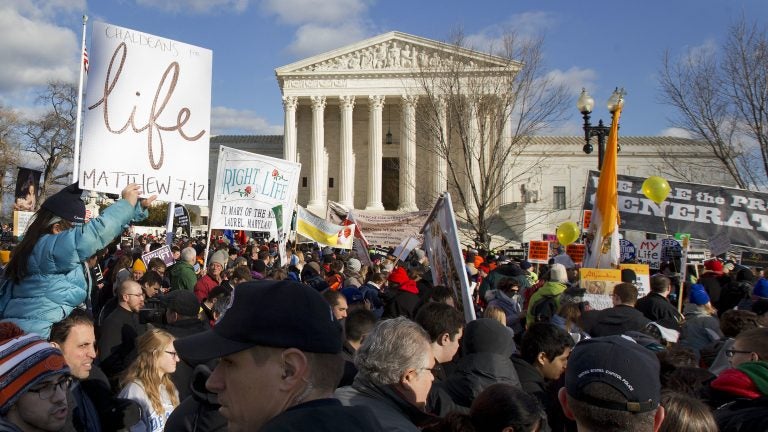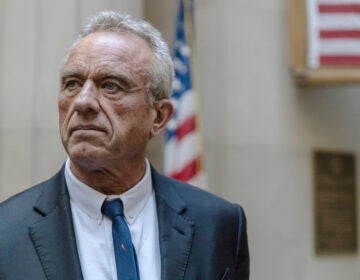With Kavanaugh confirmed, both sides of abortion debate gear up for battle

Abortion opponents see the confirmation of Brett Kavanaugh to the U.S. Supreme Court as an opportunity to push for further abortion restrictions. Abortion supporters are preparing for a fight. (Jacquelyn Martin/AP)
The end of the fight over Brett Kavanaugh’s Supreme Court nomination sets up a new battleground over abortion rights, and activists on both sides of the issue are gearing up for what’s likely to be a series of contentious battles from the high court to state legislatures.
Planned Parenthood is unveiling a new strategy designed to prepare for the possibility of a nation without the federal protections for abortion rights outlined in the 1973 Roe v. Wade decision.
In an exclusive interview with NPR, Planned Parenthood Executive Vice President Dawn Laguens said the reproductive rights group is preparing to “super-size” its efforts to connect women with abortion services in what could become an increasingly difficult environment. Already, she said, women in many states with restrictive abortion laws have difficulty obtaining the procedure.
“Over the last years, obviously, there has been a great retraction of access for women in this country in many, many states,” Laguens said.
Abortion rights opponents have been working for decades to pass new restrictions at the state and national levels, with their eyes the ultimate prize: overturning Roe and other Supreme Court decisions that have affirmed the right to an abortion. Both sides see that possibility as far more likely with Justice Kavanaugh on the court. He replaced retiring Justice Anthony Kennedy, who had often been the court’s swing vote on abortion and other controversial matters.
Life after Roe?
Planned Parenthood’s new strategy to fight back includes three major components: expanding access in states with laws favorable to reproductive rights; policy work aimed at strengthening reproductive rights; and efforts to reduce stigma surrounding abortion.
If Roe were overturned or substantially weakened, state legislatures would become the front lines of the fight. Officials at Planned Parenthood and other groups are preparing to lobby state lawmakers and other elected officials to strengthen protections for abortion and remove restrictions already on the books.
In states with more liberal laws, abortion rights advocates see an opportunity to shore up and expand access, with an eye toward serving women from other states. That could include expanding access to medicated abortion through telemedicine and using technology to inform women about how and where they can access services, Planned Parenthood officials said.
“Already women across this country have to access funding; they have to access transportation; they have to access housing; they have to access support networks,” Laguens said. “That is gonna be a greater need if there are further restrictions when Roe is attacked by this court.”
In Illinois, the organization has expanded its surgical abortion services from two to five locations over the past two years, said Dr. Amy Whitaker, medical director at Planned Parenthood of Illinois.
Whitaker said she already serves women from throughout the Midwest, and she expects to do that “on overdrive” if Roe is overturned and surrounding states pass increasingly restrictive laws.
“With Kavanaugh on the court we know that we’re gonna need an ironclad network of states and providers across the country where abortion will still be legal and accessible, no matter what happens on the Supreme Court,” Whitaker said.
Cultural influencers
As a final step, Planned Parenthood’s Vice President of Communications, Kevin Griffis, said the organization recently restructured its communications division to create a team focused on working with “cultural influencers” like television writers and producers to tell stories about abortion and reproductive health. The organization has been consulted on shows including CW’s Jane the Virgin, HBO’s Girls and Fox’s Glee, he said.
“[Stigma] truly is at the heart of the attacks that we’re seeing,” Griffis said. “And I think the key to reducing that is really being able to change people’s perception of abortion so that they see it for what it is — which is a really safe medical procedure and a typical, standard part of healthcare.”
Courts and statehouses
Abortion rights opponents also are preparing for the next phase of this fight, said Concerned Women for America CEO and President Penny Nance.
As soon as Kavanaugh was sworn in, Nance said, abortion rights opponents “were talking about, starting to get together and think about the best cases to move forward, to put in front of the court.”
Several states have passed abortion restrictions that are currently being litigated and could eventually come before the Supreme Court. Iowa, for example, passed one of the most restrictive laws earlier this year. That law, banning abortion as soon as a fetal heartbeat could be detected, was blocked by a county judge before it could take effect.
Nance said abortion opponents also will be preparing to continue to push for new abortion restrictions at the state level.
“The state legislature for the past 10 years have been very fertile ground for moving the ball down the field on the issue of life,” Nance said. “And so we will continue those efforts, and I think we will continue to see success.”
But first, the mid-terms
While advocates on both sides of the abortion debate are looking ahead to legal battles in the coming months and legislative sessions next year, neither side is losing sight of another opportunity to rally each base — the mid-term elections, now less than a month away.
The abortion rights group NARAL is launching a $750,000 direct mail and digital ad campaign aimed at suburban female voters in eight cities. The group has also launched a $1 million ad campaign targeting Republican candidates and urging abortion rights supporters to “vote them out.” The group is running ads spring-boarding off Kavanaugh’s confirmation and warning that the Republican Party “harms and silences” women.
Fresh off their victory in the Kavanaugh fight, abortion opponents are also running mid-term get-out-the-vote campaigns.
Mallory Quigley, Vice President of Communications for the abortion opponent group Susan B. Anthony List, said her group’s primary focus now is on voter canvassing and other efforts leading up to the mid-term elections next month.
“The Kavanaugh confirmation battle kind of exemplified…why we’ve been engaging in Senate races across the country since last summer,” she said. “And that’s precisely because the Senate is where Supreme Court justices are confirmed.”
9(MDAzMzI1ODY3MDEyMzkzOTE3NjIxNDg3MQ001))




